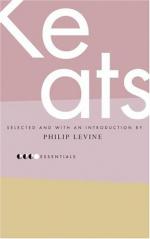|
This section contains 3,312 words (approx. 12 pages at 300 words per page) |

|
SOURCE: "Naming the Lost: The Poetry of Philip Levine," in Michigan Quarterly Review, Vol. XXVIII, No. 2, Spring, 1989, pp. 258-66.
In the following essay, Hirsch considers the evolution of Levine's poetry and its gradual change in themes and attitudes. He declares it begins in rage, grows into elegy, and culminates in celebration. He stresses Levine's growing belief in human acceptance and possibility.
I force myself
to remember
who I am, what I am, and
why I am here.
Silent in America"
In his seminal postmodern meditation, "Thinking Against Oneself," the philosopher E. M. Cioran argues that "We measure an individual's value by the sum of his disagreements with things, by his incapacity to be indifferent, by his refusal as a subject to tend toward the object." Philip Levine's poetry is characterized by just such a profound disagreement with things as they are, by an incapacity for indifference and a...
|
This section contains 3,312 words (approx. 12 pages at 300 words per page) |

|


